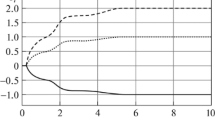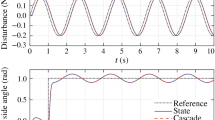Abstract
In this paper, we present a design method based on the concept of equivalent input disturbance (EID) to reject disturbances for a linear time-invariant system. A generalized state observer (GSO) is used to estimate an EID of the external disturbances, and the pole-assignment algorithm is employed to select the matrices of the GSO. Simulation and experimental results of a rotational speed control system demonstrate the validity of our method.
Similar content being viewed by others
References
S. Ruegsegger, A. Wagner, J. S. Freudenberg. Feedforward control for reduced run-to-run variation in microelectronics manufacturing. IEEE Transactions on Semiconductor Manufacturing, 1999, 12(4): 493–502.
A. Jidin, N. R. N. Idris, N. D. Muhamad. Sliding mode variable structure control design principles and application to DC drives. Proceedings of National Power & Energy Conference (PECon). New York: IEEE, 2004: 78–82.
S. Skoczowski, S. Domek, K. Pietrusewicz. A method for improving the robustness of PID control. IEEE Transactions on Industrial Electronics, 2005, 52(6): 1669–1676.
K. He, S. Huang. Research on the controller of an arc welding process based on a PID neural network. Journal of Control Theory and Applications, 2008, 6(3): 327–329.
S. Hua, Y. Dai. Fuzzy PID control and simulation experiment on permanent magnet linear synchronous motors. International Conference on Electrical and Control Engineering. Los Alamitos, CA: IEEE Computer Society, 2010: 1047–1049.
Y. Choi, K. Yang, K. C. Wan. On the robustness and performance of disturbance observers for second-order systems. IEEE Transactions on Automatic Control, 2003, 48(2): 315–320.
L. Ding, J. Fang, T. Wei. Disturbance rejection based on disturbance observation for magnetic suspended rotor. Bearing, 2009, 8: 6–9 (in Chinese).
X. Wen, L. Guo, Y. Zhang. Estimation of unknown sinusoidal disturbances using two-step nonlinear observer. Proceedings of the 30th Chinese Control Conference. Piscataway: IEEE, 2011: 6181–6186.
J. C. Doyle, G. Stein. Robustness with observers. IEEE Transactions Automatic Control, 1979, 24(4): 607–611.
A. Isidori, C. L. Byrnes. Output regulation of nonlinear systems. IEEE Transactions on Automatic Control, 1990, 35(2): 131–140.
R. Marino, P. Tomei. Adaptive tracking and disturbance rejection for uncertain nonlinear systems. IEEE Transactions on Automatic Control, 2005, 50(1): 90–95.
Z. Ding. Asymptotic rejection of general periodic disturbances in output-feedback nonlinear systems. IEEE Transactions on Automatic Control, 2006, 51(2): 303–308.
G. Liu, Q. Guo. Model-based disturbance attenuation for linear motor servo system. IEEE 5th International Power Electronics and Motion Control Conference. Piscataway: IEEE, 2006: 896–898.
B. K. Chio, C. H. Chio, H. Lim. Model-based disturbance attenuation for CNC machining centers in cutting process. IEEE/ASME Transactions on Mechatronics, 1999, 4(2): 157–168.
B. Yao, M. A. Majed, M. Tomizuka. High performance robust motion control of machine tools: an adaptive robust control approach and comparative experiments. American Control Conference. Evanston, IL: American Automatic Control Council, 1997: 2754–2758.
T. A. Davis, Y. C. Shin, B. Yao. Observer-based adaptive robust control of friction stir welding axial force. IEEE/ASME Transactions on Mechatronics, 2011, 16(6): 1032–1039.
S. Zhao, Z. Gao. Active disturbance rejection control for nonminimum phase systems. Proceeding of the 29th Chinese Control Conference. Piscataway: IEEE, 2010: 6066–6070.
J. She, M. Fang, Y. Ohyama, et al. Improving disturbance rejection performance based on an equivalent-input-disturbance approach. IEEE Transactions on Industrial Electronics, 2008, 55(1): 380–389.
J. She, X. Xin, Y. Pan. Equivalent-input-disturbance approach- Analysis and application to disturbance rejection in dual-stage feed drive control system. IEEE/ASME Transactions on Mechatronics, 2011, 16(2): 330–340.
M. Fang, M. Wu, J. She. Active structural control based on the concept of equivalent-input-disturbance. International Journal of Factory Automation, Robotics, and Soft Computing, 2009, 1(1): 11–16.
D. Zheng. Linear System Theory. 2nd ed. Beijing: Tsinghua University Press, 2002.
M. Wu, Y. He. J. She. Robust Control Theory. 3rd ed. Beijing: Higher Education Press, 2011.
A. Gattami. Generalized linear quadratic control. IEEE Transactions on Automatic Control, 2010, 55(1): 131–136.
Author information
Authors and Affiliations
Corresponding author
Additional information
This work was partly supported by the National Natural Science Foundation of China (Nos. 61210011, 60974045, 61125301).
Min WU received his B.S. and M.S. degrees in Engineering from the Central South University, Changsha, China, in 1983 and 1986, respectively. He received his Ph.D. degree in Engineering from Tokyo Institute of Technology, Tokyo, Japan, in 1999. Since July 1986, he has been with the Central South University, where he is currently a professor of Automatic Control Engineering in the School of Information Science and Engineering. His current research interests are robust control, process control and intelligent control. Dr. Wu is a senior member of the IEEE.
Kunpeng LOU received his B.S. degree in Engineering from the Central South University, Changsha, China, in 2009. Currently, he is an M.S. candidate at the Department of Control Engineering, the School of Information Science and Engineering, Central South University, China. His current research interests are bionic quadruped robot and robust control.
Fangchun XIAO received her B.S. degree in Engineering from the Central South University, Changsha, China, in 2010. Currently, he is an M.S. candidate at the Department of Control Engineering, the School of Information Science and Engineering, Central South University, China. Her current research interests are robust control and repetitive control.
Ruijuan LIU received her B.S. and M.S. Degrees in Mathematics from Changsha University of Science and technology, China, in 2004 and 2008, respectively. Currently, she is a Ph.D. candidate at the School of Information Science and Engineering, Central South University, China. Her current research interest are robust control and its application.
Yong HE received his B.S. and M.S. degrees in Applied Mathematics from Central South University, Changsha, China in 1991 and 1994, respectively. In July 1994, He joined the staff of the university, where he is currently a professor in the School of Information Science and Engineering. He received his Ph.D. degree in Control Theory and Control Engineering from Central South University in 2004. From January 2005 to March 2006, he was a research fellow in the Department of Electrical and Computer Engineering, National University of Singapore. From March 2006 to January 2007, he was a research fellow in the Faculty of Advanced Technology, University of Glamorgan, U.K. He received the Guan Zhao-Zhi Award of the 26th Chinese Control Conference in 2007 (jointly with M. Wu, G. Liu and J. She). Professor He is a senior member of the IEEE. His current research interests include robust control and its applications, networked control, and process control.
Jinhua SHE received his B.S. degree in Engineering from the Central South University, Changsha, China, in 1983, and M.S. and Ph.D. degrees in Engineering from Tokyo Institute of Technology, Tokyo, Japan, in 1990 and 1993, respectively. In 1993, he joined the Department of Mechatronics, School of Engineering, Tokyo University of Technology, Tokyo. In April 2008, he joined the School of Computer Science, Tokyo University of Technology, where he is currently a professor. His research interests include applications of control theory, repetitive control, process control, Internetbased engineering education, and robotics. Dr. She is a member of the Society of Instrument and Control Engineers, the Institute of Electrical Engineers of Japan, the Japan Society of Mechanical Engineers, and the Asian Control Association. He was the recipient of the International Federation of Automatic Control (IFAC) Control Engineering Practice Paper Prize in 1999 (jointly with M. Wu and M. Nakano).
Rights and permissions
About this article
Cite this article
Wu, M., Lou, K., Xiao, F. et al. Design of equivalent-input-disturbance estimator using a generalized state observer. J. Control Theory Appl. 11, 74–79 (2013). https://doi.org/10.1007/s11768-013-1169-0
Received:
Revised:
Published:
Issue Date:
DOI: https://doi.org/10.1007/s11768-013-1169-0




